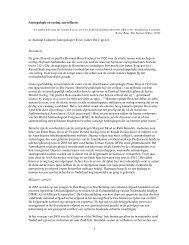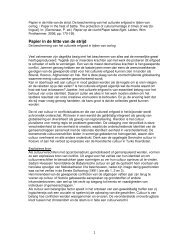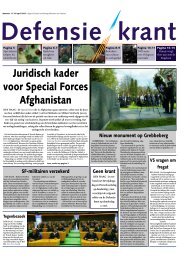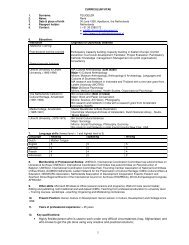The whole publication in PDF - Culture in Development
The whole publication in PDF - Culture in Development
The whole publication in PDF - Culture in Development
Create successful ePaper yourself
Turn your PDF publications into a flip-book with our unique Google optimized e-Paper software.
is no doubt about that. Reality, however, is different. What can one do with hundreds, thousands of files, each<br />
conta<strong>in</strong><strong>in</strong>g dozens or hundreds of sheets of paper, all filled with text and draw<strong>in</strong>gs, some of them torn and soiled,<br />
others brittle, and so on? What is to be done with the backlog? Current activities are well aim ed, and often costeffective,<br />
but the level of activities is disproportionate to the extent of the problem.<br />
Traditional conservation techniques may be sufficient for cop<strong>in</strong>g with several k<strong>in</strong>ds of mechanical, biological<br />
and chemical damage, but one should consider any irreversib le technique to be a potential danger. For examp le, it<br />
has been reported that <strong>in</strong> some European countries major damage to records was due to their chemical treatment <strong>in</strong><br />
the past. Even the use of lam<strong>in</strong>ation for stabiliz<strong>in</strong>g archive materials is questioned and could well turn out to be a<br />
counter-productive preservation process. However, for documents near<strong>in</strong>g the no-touch l<strong>in</strong>e, it may be the o nly<br />
solution for preservation for the time be<strong>in</strong>g.<br />
On their own all archivists are m<strong>in</strong>or players <strong>in</strong> safeguard<strong>in</strong>g the elements of the Memory of Humanity entrusted<br />
to them. Two possible outcomes of a world wide performance analysis of this role of archive services could be a<br />
recommendation to globalize workshops for technical services, and to globalize storage facilities as well. Many<br />
barriers will have to be dism antled.<br />
Globaliz<strong>in</strong>g <strong>in</strong>tellectual access has been an odd idea. What else, however, will be the outcome of the <strong>in</strong>troduction<br />
of electronic formats and electronic f<strong>in</strong>d<strong>in</strong>g aids? One cannot cut communication l<strong>in</strong>es <strong>in</strong> order to keep the electronic<br />
data on-site.<br />
Globaliz<strong>in</strong>g storage facilities and technical services still sounds odd, but the profession should start consider<strong>in</strong>g<br />
such options. <strong>The</strong> Indonesian – Dutch co-operation sets an <strong>in</strong>terest<strong>in</strong>g example. Options for improvement of cooperation<br />
<strong>in</strong> the fields of micro-film<strong>in</strong>g, digitization, restoration, computer storage capacity and tra<strong>in</strong><strong>in</strong>g should be<br />
studied, sponsors should be identified and engaged.<br />
Cooperation at <strong>in</strong>stitutional, national and <strong>in</strong>ternational levels, <strong>in</strong> conjunctio n with libraries and museum s, would<br />
be one of the ways of ensur<strong>in</strong>g the better preservation of the Memory of Humanity. Progress <strong>in</strong> modern technology<br />
may assist <strong>in</strong> cop<strong>in</strong>g with some of the problems posed by both natural and man-made hazards and by the ever<br />
<strong>in</strong>creas<strong>in</strong>g quantity of archives to be kept. However, the <strong>in</strong>formation age will not solve the problems of record<br />
keep<strong>in</strong>g, on the contrary it will only add more problems. No adm<strong>in</strong>istration has produced more records, both <strong>in</strong> paper<br />
and <strong>in</strong> electronic format, than this era called the <strong>in</strong>formation age. T ogether all arc hives services worldwide take <strong>in</strong><br />
accruals on an annual basis of a few hundred l<strong>in</strong>ear kilometers, or more, someth<strong>in</strong>g like the distance between Jakarta<br />
and Jogjakarta. On top of this we receive huge quantities of electronic data, data that will have no significance if<br />
not prepared for transfer together with software and necessary documentation. And to add to this, one should not<br />
forget the masses of audio-visual materials, such as TV reels, audio tapes, still and mov<strong>in</strong>g film, etc.<br />
<strong>The</strong> <strong>in</strong>itiative of the Arsip Nasional Republik Indonesia together with the National Archives of <strong>The</strong> N etherlands <strong>in</strong><br />
organis<strong>in</strong>g a sem<strong>in</strong>ar on preservation of archives <strong>in</strong> tropical climate zones and <strong>in</strong> commission<strong>in</strong>g a an annotated<br />
bibliography on preservation of archives <strong>in</strong> tropical climates could turn out to be a decisive step towards develop<strong>in</strong>g<br />
tropical archivology as a subject <strong>in</strong> its own right, a subject that should form the subject of one of the next ICA<br />
International Congresses on Archives. Such a tropical archivology should provide for best practices and standards<br />
for record keep<strong>in</strong>g <strong>in</strong> tropical countries, and can only be developed <strong>in</strong> close co-operation between professional and<br />
other partners. <strong>The</strong> Jakarta conference was a first step.<br />
Joan van Albada<br />
Secretary General of the International Council on Archives






